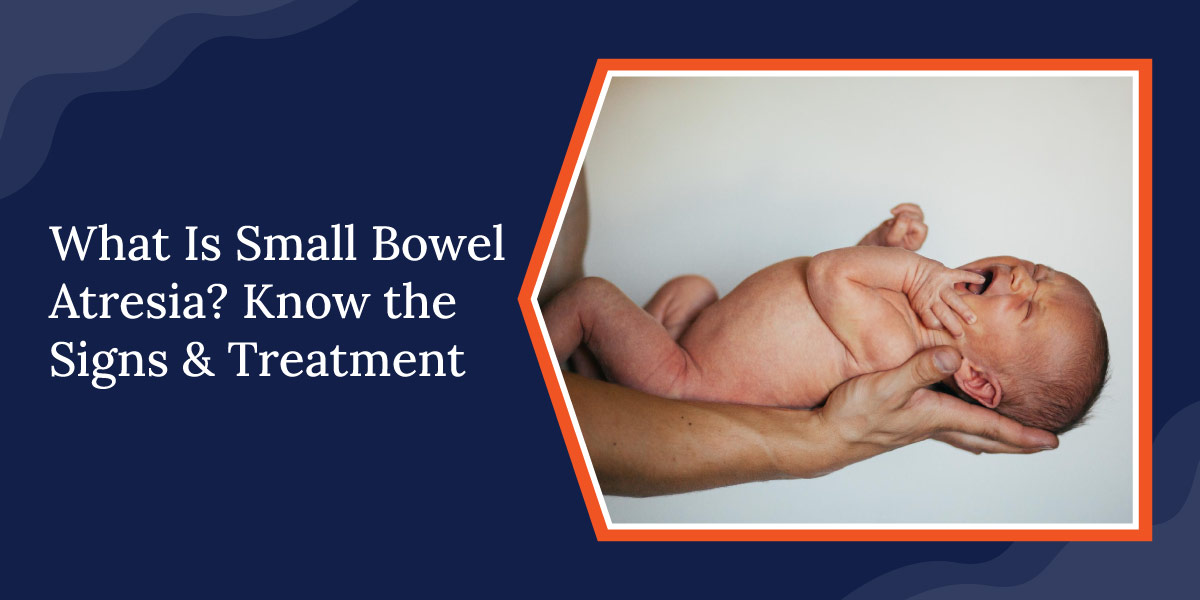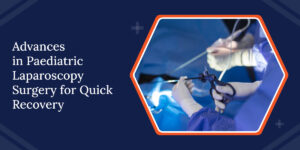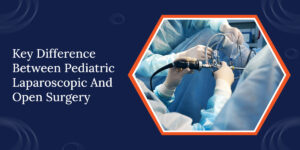
Early diagnosis and quick treatment can make a big difference. Your baby might need surgery, but many babies recover well with the right care. This guide explains what small bowel atresia is, how to spot the signs, and what treatment congenital intestinal atresia involves.
A] Understand the Digestive Anatomy of a Baby
A baby’s digestive tract is made up of several connected parts. The small bowel (or small intestine) is a long tube that absorbs nutrients. It has three main parts: the duodenum, jejunum, and ileum. These connect to the large intestine, also called the colon.
In small bowel atresia, a blockage can occur in any part of this tube. The most common areas are:
- Ileal atresia: A blockage in the ileum.
- Jejunal atresia: A blockage in the jejunum.
- Colonic atresia: A blockage in the large intestine.
Each type of blockage, whether in the ileum, jejunum, or your baby’s intestine, affects digestion differently; however, it can be treated.
Concerned About Small Bowel Atresia? – Book a Consultation
B] What Are the Types of Intestinal Atresia?
There are several types of intestinal atresia. Each is named after the part of the bowel affected:
- Jejunoileal atresia: Affects the jejunum or ileum.
- Duodenal atresia: Blockage in the first part of the small bowel.
- Ileal atresia: Affects the lower part of the small intestine.
- Colonic atresia: Blockage in the large intestine.
- Pyloric atresia: A rare type that occurs near the stomach.
Doctors may use the term intestinal stenosis for a narrow passage instead of a full blockage. Obstruction means food can’t pass through as it should.
C] What Causes Small Bowel Atresia?
Doctors believe that intestinal atresia is often caused by a disruption in blood flow during pregnancy. Without enough blood, a section of the intestine may not form completely. This is one cause of a congenital anomaly.
Some babies with small bowel atresia also have cystic fibrosis or a condition called meconium ileus, where thick stool blocks the intestines.
In rare cases, a baby might have multiple atresias, affecting more than one area. This can make treatment more complex.
D] Common Symptoms in Newborns
Intestinal atresia symptoms usually show up shortly after birth. These include:
- Bilious vomiting (green-coloured vomit).
- A swollen or firm belly (abdominal distension).
- No bowel movement within the first 24 to 48 hours.
- Signs of bowel obstruction, like fussiness or feeding trouble.
- Trouble keeping milk down (frequent spitting up or vomiting).
These are common intestinal atresia symptoms, and your baby should be checked by a doctor right away.
Also read: Infant Hernia: What Is It and How to Treat It?
E] How Is It Diagnosed?
In some cases, doctors may detect signs before birth. Excess amniotic fluid may suggest a problem. After birth, your baby may show abdominal distention or have no bowel movement.
Doctors use imaging tests to confirm a diagnosis. An abdominal X-ray can show dilated bowel loops, which means gas or stool is trapped.
Other tests, such as a contrast enema or ultrasound, help find the exact location of the blockage. Early diagnosis of atresia helps plan the best care.
F] Treatment Options for Small Bowel Atresia
Surgery is needed to fix the blockage. A paediatric surgeon removes the damaged part and connects the healthy ends. This allows food to pass through again.
You can find small bowel atresia treatment in Dubai by consulting a specialist who can provide timely and effective care for your child.
Sometimes, the surgeon places a feeding tube or nasogastric tube to help your baby get nutrition until the bowel heals. The timing of feeds depends on how the baby recovers after surgery.
Treatment for intestinal atresia is often urgent, especially if the bowel is severely swollen or twisted. The care team will monitor your baby closely.
G] Post-Surgery Care and Recovery
After surgery, your baby may spend time in the NICU. A special feeding plan helps the intestines start working again. Postoperative care varies, depending on how much bowel was removed.
Some babies develop short bowel syndrome, which means the intestines don’t absorb food well. This may require extra nutritional support.
Your baby’s bowel movement and weight gain will be observed closely. Regular follow-ups help track recovery.
H] When to Consult a Paediatric Surgeon?
If your newborn has feeding problems or vomiting, contact a paediatric surgeon early. Timely action can prevent serious issues.
Signs to watch for:
- Green vomit
- Swollen belly
- No bowel movement
- Crying or discomfort after feeding
Paediatric surgery can correct most types of this problem. Early care often leads to a good outcome and prevents newborn digestive issues.
Concerned About Small Bowel Atresia? – Book a Consultation
I] Conclusion
Finding the answer to “What is intestinal atresia?” is important to keep your baby’s intestinal condition healthy. Small bowel atresia is a serious condition, but with timely diagnosis and expert care, babies can recover well.
Awareness helps you act quickly. With proper treatment and monitoring, your baby can grow and thrive. If you’re concerned about symptoms or need a diagnosis, book an appointment with Dr. Bhushanrao Jadhav, a leading paediatric surgeon in Dubai, to ensure your child receives timely and reliable care.
J] Frequently Asked Questions
- Is small bowel atresia a birth defect?
Yes. It is a type of congenital intestinal atresia that affects how part of the small bowel forms during pregnancy. It is present at birth and often requires early treatment.
- Can small bowel atresia be detected before birth?
Yes, in some cases, it can be suspected through prenatal ultrasound. Excess fluid around the baby may point to a blockage, but the final diagnosis usually happens after birth.
- What is the survival rate for babies with small bowel atresia?
The survival rate is high with timely surgery and proper care. Most babies recover well and go on to live healthy lives.
- How long does recovery take after surgery?
It depends on how much bowel was removed and how your baby responds. Recovery may take a few weeks, and feeding will begin slowly under supervision.
- Can a baby live without part of their intestine?
Yes. Many babies do well even if a portion of their intestine is removed. The remaining bowel often adapts over time, learning to absorb nutrients more efficiently.

Dr. Bhushanrao Jadhav
Dr. Bhushanrao Jadhav is a highly skilled Pediatric Surgeon and Urologist specialising in minimally invasive and robotic surgeries for children. With advanced training from leading institutions in the UK, India and USA, he brings expertise in treating complex genitourinary conditions and neonatal surgical ailments. Driven by compassion and innovation, Dr. Jadhav has pioneered pediatric robotic surgery programs in Pune, India, ensuring world-class care tailored to children’s unique needs.




















